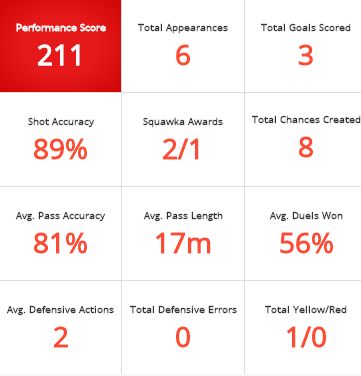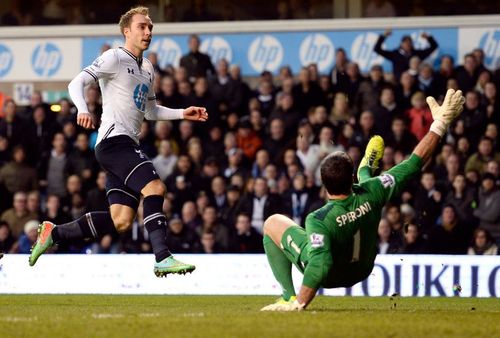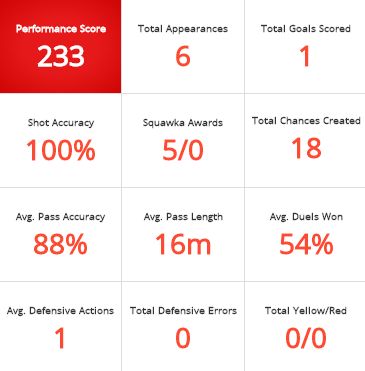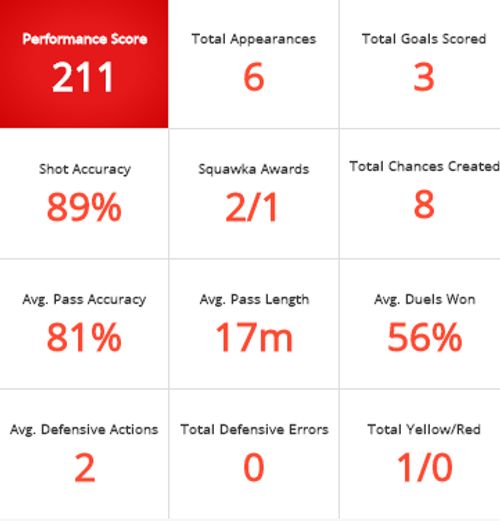
Ozil vs Eriksen: Who is ahead in the race?

Both North London clubs invested heavily in the summer transfer window in attacking midfield talent. Whilst Arsenal smashed their transfer record with a £42.5 million move for Mesut Ozil, Tottenham’s latest playmaking star came at a relatively meagre £11million. Christian Eriksen suffered an injury hit start to his Spurs career, but his recent performances have left Tottenham fans dubbing him as being better than Ozil. So who is right? Squawka take a look at what the stats have to say.
On the face of it, Ozil appears to have the upper hand with both more goals and more assists than his Danish counterpart.

Ozil has created 51 chances this season, amounting to one every 29 minutes that he has spent on the pitch. Eriksen, who is second amongst Spurs players for chances created this season, has created 26. This amounts to one every 37 minutes of Premier League action.
 Eriksen Chances Created
Eriksen Chances Created
Perhaps understandably given his injury problems, Eriksen has taken longer to cement himself as integral to the Spurs side. He has often been played wide rather than in his favoured central playmaking role, whereas Ozil has become a fixture behind Olivier Giroud in the Arsenal midfield. Ozil has accounted for 20% of Arsenal’s chances this season, with much of their creative play going through him, whereas Eriksen has provided less than 10% of Tottenham’s created opportunities (which, incidentally, amount to 19 chances more than Arsenal despite Spurs scoring 14 fewer Premier League goals.)

Premier League Top Assisters This Season
Arsenal’s German has also seen more of the chances that he has created put away by his teammates. He has seven assists this season, the third highest in the Premier League, whereas Eriksen has just three.

He has also been sharper on the ball across the season as a whole. Whilst he has played 1479 minutes to Eriksen’s 951, Ozil has completed more than double the number of passes that the Tottenham man has. A degree of that can, of course, be put down to Arsenal’s style of play, but even when accounting for the disparity in the number of passes made by each team and the two men’s differing times on the pitch, Ozil is ahead.
 Eriksen Shot Accuracy (88% Shot Accuracy)
Eriksen Shot Accuracy (88% Shot Accuracy)
Eriksen does, however, fare better in terms of goalscoring. Whilst Ozil has one more goal than Eriksen, he has a worse goal to minute ratio than the Tottenham man. Interestingly, all of Eriksen’s goals have come in his last six league games, adding credence to the claim that his recent form is better.
The former Ajax man has hit the target with 88% of his shots this season, and has hit a shot every 59 minutes compared to Ozil’s one per 82 minutes.
Whilst Ozil has fared better across the season as a whole, Eriksen’s form has stepped up a level in recent weeks. Over their last six Premier League fixtures, just 23 points separate the pair by Squawka Performance Score, with Ozil leading 233 to 210.
Eriksen has scored three goals in his last six games, whilst Ozil has just one in that period, this has seen his impact questioned by the likes of Michael Owen and Gary Neville.

However, Ozil has maintained his creative input over the period in question. Eriksen has created just eight chances over his last six games – a total that Ozil matched in just one game against West Ham at the end of December. The former Real Madrid man has created 18 chances during his last six games, ten more than Eriksen.
 Mesut Ozil Key Stats From Last Six Games
Mesut Ozil Key Stats From Last Six Games
Both men have had a strong impact upon their clubs this season, but the claim that Eriksen is better than Ozil is premature. Even when Eriksen has stepped up his performances and Ozil’s have been perceived to have slipped, Ozil has scored higher in both chances created and Performance Score.
 Christian Eriksen Key Stats From Last Six Games
Christian Eriksen Key Stats From Last Six Games
Eriksen has shown promise in recent weeks, and does bring better defensive qualities than his Arsenal rival – Ozil has made just one tackle in his last seven games – but in their key role of keeping possession and creating goalscoring opportunities Ozil comes out top. With the pair likely to be at the heart of both sides for seasons to come, the comparison could provide an intriguing subplot to the continuing rivalry between the clubs.